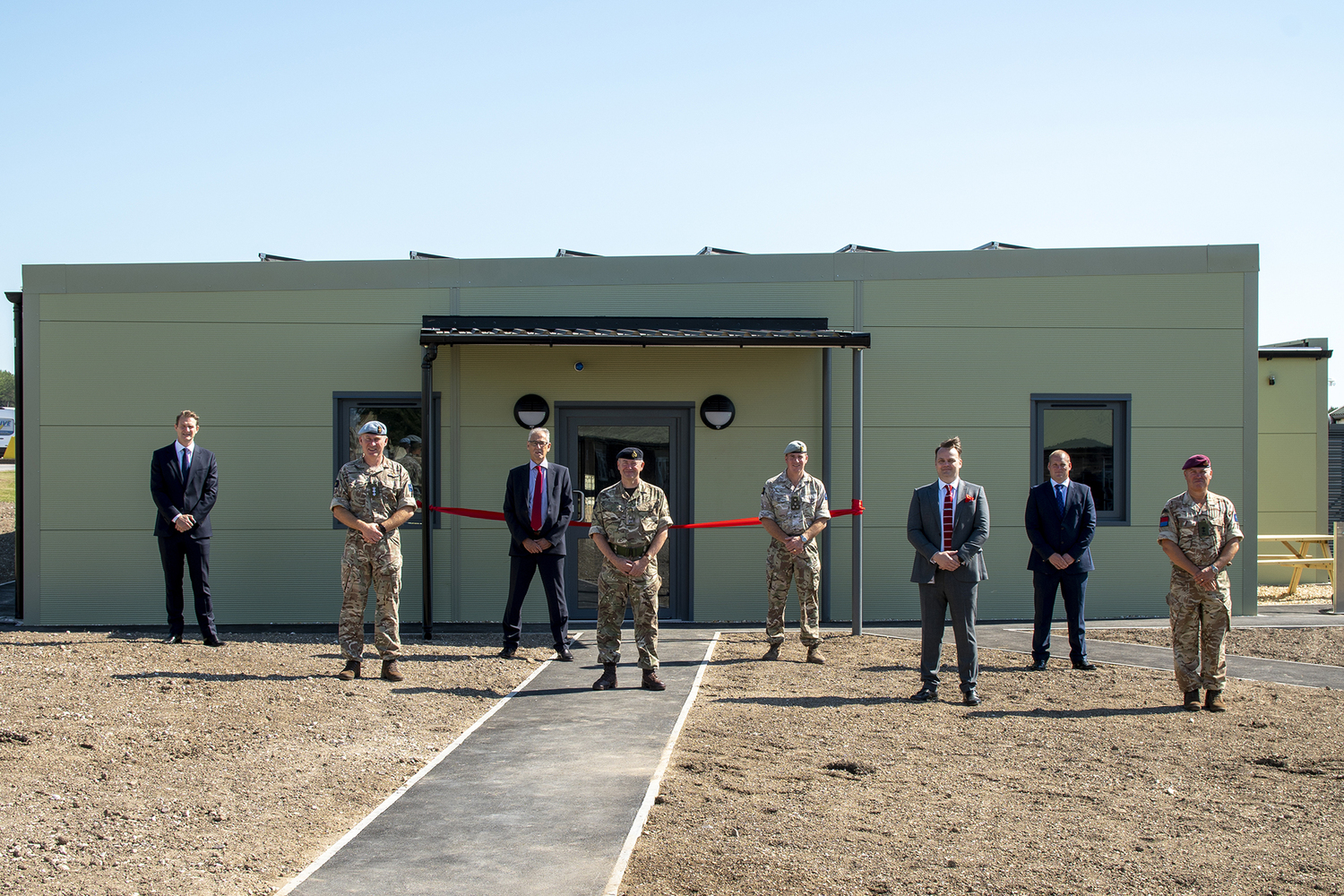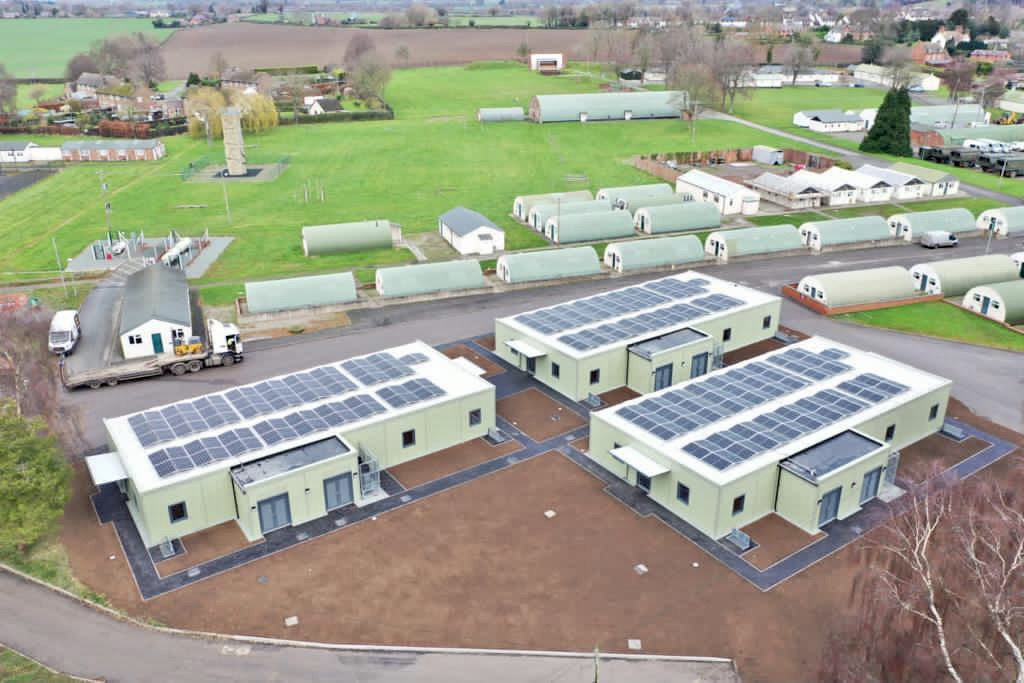26 January 2021
Soldiers using Salisbury Plain and Nesscliff Training Areas are the first to benefit from new carbon efficient accommodation, delivered as part of the £45m Net Carbon Accommodation Programme.
The programme is being part-funded using money from a £200m investment to improve Armed Forces accommodation, which was announced by the Defence Secretary last summer.
The MOD is investing more than £35m of this funding, in addition to funding from the British Army, into its nationwide programme, which aims to improve facilities for troops when they are training away from their permanent barracks.
Sustainable Updates to MOD Infrastructure
"[Landmarc are] delighted to work with DIO and Reds10 to deliver a programme that will not only support the government’s commitment to improving living accommodation for our Armed Forces but will also provide a highly energy efficient solution that will help DIO meet its long-term carbon reduction commitments.”
– Mark Neill
Managing Director, Landmarc
38 new carbon efficient accommodation blocks, providing more than 1,700 bed spaces, will be installed across the UK Defence Training Estate by the Defence Infrastructure Organisation (DIO), working with industry partner Landmarc Support Services and its contractor Reds10. The remainder of the £200 million investment is being spent on Service Family Accommodation and training accommodation at Longmoor Training Camp, and improvements to Single Living Accommodation in Army barracks, RAF bases and Naval establishments.
Westdown Camp on Salisbury Plain was the first to receive the new accommodation. The modern facility has an A-rated Energy Performance Certificate (EPC), just 12 points from achieving net zero, thanks to air source heat pumps and rooftop solar panels. This prototype was further improved on for three new accommodation blocks at the second site, Nesscliff Training Area in Shropshire, which have an EPC rating of minus five. This means the buildings generate power for the site, reducing electricity costs.
Building Design Specifications
The buildings range in size as required, typically providing up to 46 bed-spaces each, which can be subdivided as needed. This innovative design means that different military units, whether trained soldiers or cadets, male or female, can be accommodated within the block together. Showers, ablutions and drying rooms are also part of the complex, improving the overall experience for personnel by removing the need for troops to move to different buildings.
All accommodation is being designed and constructed offsite by modular building specialists Reds10 before being transported to site for assembly and installation.
Paul Ruddick, CEO of Reds10 said: “Our brief was to deliver the lowest carbon usage possible. Air source heat pumps, which take supplementary electrical power from solar PV panels installed on the roof, generate the accommodation’s complete heating and hot water requirements.
“We installed SMART technology in the building at Westdown Camp, which provides detailed information on how that building is being used, its hot water and heating demand and occupancy rates. This has enabled the team to monitor the energy demands of the building and feedback directly into subsequent building design and specifications, allowing us to deliver the buildings at Nesscliff as the first net zero buildings of the programme.
“We are proud to be able to continually push our modular construction methods to deliver these sorts of results throughout the programme.”
The manufacture and installation of the single block at Westdown Camp took just 15 weeks. The team was then able to take what it had learned and reduce this to 13 weeks for three buildings at Nesscliff. Installation on site takes about a month, minimising disruption for training troops compared to traditional construction. Labour was locally sourced at each site, helping to reduce the carbon footprint and boost local economies by providing 400 jobs across the programme, 150 of which were new.
Compartmental Efficiency
Another benefit of modular construction is that it allows the same design to be used for later blocks with improvements and alterations put in place as necessary. The buildings are also equipped with SMART building technology, which optimises energy use and provides data for improvements in the design and specification of subsequent modular constructions in the programme. Lessons identified following the installation of the Westdown Camp block have not only meant that Reds10 delivered the Nesscliff buildings as net zero, but also allowed for 30 per cent reduction of embodied carbon compared to Westdown Camp.

Picture: Westdown Camp building opening.
Brigadier Jonathan Bartholomew, DIO’s Head of the Overseas and Training Region said: “DIO supports our Armed Forces by providing what they need to live, work and train. Working closely with our industry partner, Landmarc, and Reds10 we are proud to have delivered the first new accommodation blocks on time and during the current climate. These new buildings are modern, flexible and efficient and will support troops on exercise, providing them with the high-quality accommodation that they expect and deserve.”
Mark Neill, Managing Director at Landmarc, said: “The welfare of the troops that use the estate is our top priority and the accommodation facilities are a key contributor in delivering the best possible training experience.
“We are therefore delighted to work with DIO and Reds10 to deliver a programme that will not only support the government’s commitment to improving living accommodation for our Armed Forces but will also provide a highly energy efficient solution that will help DIO meet its long-term carbon reduction commitments.”
The programme will continue into 2021 and early 2022 with the installation of more carbon efficient accommodation blocks on other training sites, some of which will be larger. These sites include Knook Camp on Salisbury Plain, Brunswick Camp in Hampshire, Castlemartin in Pembrokeshire, Warcop in Cumbria and West Tofts and Wretham in Norfolk.
Picture: Aerial view of Nesscliff buildings.
Article written by Bailey Sparkes | Published 26 January 2021
Share
Related Articles
Nearly Zero Energy Requirements Extended to All New Buildings
A circular letter has been published by the UK Government to explain the minimal energy requirements in new buildings, that have been extended from the public to private...
Read Full Article
THE LINE by NEOM – An Experiment in Future Built Environments
First announced in January 2021 by His Royal Highness Mohammed bin Salman, Crown Prince of Saudi Arabia and Chair of the NEOM Company Board of Directors, THE LINE is...
Read Full Article
Festival of Sustainable Business 2022 – Mini Highlights Reel
ThisWeekinFM attended Bristol’s Paintworks for The Festival of Sustainable Business 2022, finding out about different approaches that can future-proof our...
Read Full Article
FM Contract for Armed Forces in Gibraltar Awarded to Mitie
The first of a new suite of contracts to provide essential services for the UK Armed Forces on overseas MOD bases has been awarded to Mitie.
The £155 million...
Read Full Article
Sustainable Design in the Construction Sector
100 senior executives of UK construction firms were interviewed on sustainable design and engineering.
The construction firms involved have collectively been involved...
Read Full Article
Sustainable Hospitals in Development for Leeds
Leeds Teaching Hospitals NHS Trust has set an ambition to meet new standards for greener and more sustainable hospitals in the UK, as part of its Hospitals of the Future...
Read Full Article
British Land to open Storey at 100 Liverpool Street
Storey, British Land’s flexible workspace brand, will be opening its 12th location at 100 Liverpool Street, Broadgate in Spring 2021.
Comprising...
Read Full Article
Green Gothenburg Moves on Net-Zero Transport Goal
Currently in development, Gothenburg Green City Zone is a world first as an initiative by a number of major stakeholders including Volvo Cars to build a...
Read Full Article
Islay Distillery Targets Net-Zero with Hydrogen Innovation
Protium Green Solutions, the UK‐based green hydrogen energy services company, has received more than £70,000 in funding to complete a...
Read Full Article
The First Net-Zero Quick-Service Restaurant?
The McDonald’s Flagship-Disney recently completed construction, aiming to be the first Net-Zero restaurant in the quick-service industry,...
Read Full Article

.gif)
.gif)


.gif)







.png)

.png)
